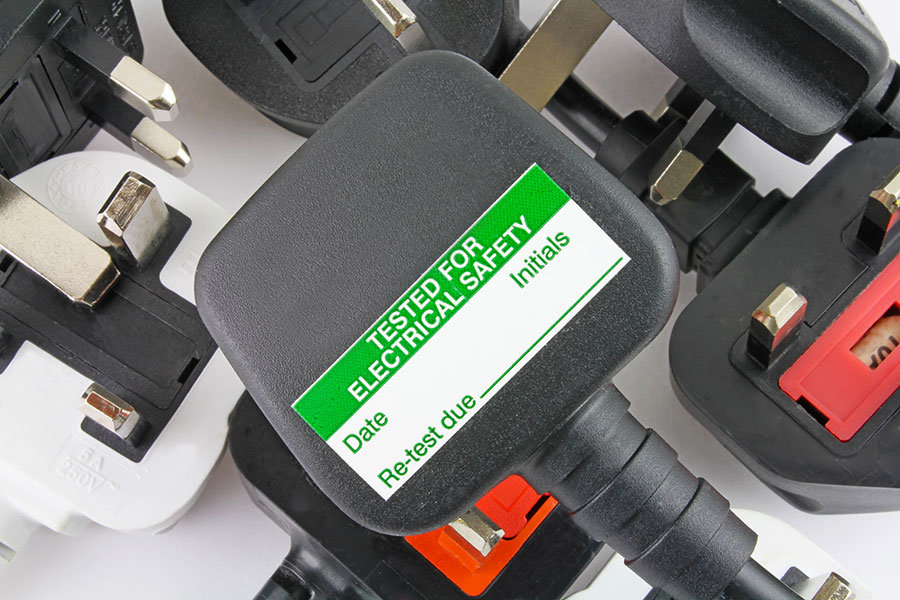Numerous individuals including landlords, employers, and the self-employed may not be aware that there are certain rules surrounding the safe operation of portable electrical appliances known as PAT testing, that is requirement by law under the Health and Safety at Work Act 1974.
Although there are no set rules on how often PAT testing must occur, the tests should be done regularly to decrease the chances of problems associated with failure that might cause fire or serious injury.
In this article, we explain the different factors that influence PAT testing frequency and how it may affect you as business or property owner.
Below are 8 key points that outline what PAT testing is for and how often your electrical appliances should be tested. The different aspects associated with electrical equipment and appliances that a landlord, employer and self-employed individual is required to do to ensure they are working correctly is also explained.
Table of Contents
1) What is PAT Testing?
PAT testing, also known as portable appliance testing is a method of inspecting electrical appliances and related equipment, to ensure they are safe and running properly with no dangerous defects.
A portable appliance is deemed to be one that runs between 40 and 240 volts and is connected to the mains via a standard three pin plug.
There are a few processes involved which includes visual inspection and electrical testing. Proper maintenance is necessary and portable appliances must be checked at regular intervals, usually recommended every twelve months. Strangely however, there is no regulation on how often PAT testing must occur, but it is a requirement to protect people that may use or operate equipment or appliances.
2) Who Carries Out PAT Testing?
PAT testing must be carried out by a competent professional who can identify any obvious defects, usually a qualified electrician or electrical engineer.
They will usually test items including wall plugs, leads, fuses and flexes.
If signs of defects are present, further inspection will be carried out using electrical testing equipment to find possible further faults.
3) Is PAT Testing Compulsory?
Under the Health and Safety at Work Act 1974 and Electricity at Work Regulations Act of 1989, it is required that portable electrical equipment must be maintained to a suitable standard and comply with statutory obligations and so must be checked regularly.
Current legislation does not state how frequently inspections or testing must occur and there are no legal requirements to do this every year. But if an injury occurs to improper maintenance to equipment or appliances, then employers or property owners can be held accountable.
4) Shops, Offices & Hotels
Appliances that fall under Class 1 regulations including extension leads and portable equipment should be checked every 2 years, whereas IT equipment should ideally be tested every 4 years.
Handheld equipment should be tested ideally once a year. This is mandatory and a fully qualified and technically proficient electrical engineer should carry out these duties.
5) Schools & Universities
For educational establishments such as schools and universities, it is necessary that appliances be PAT tested every 12 months whereas equipment that is Class 2 rated should be tested every 2 years.
The safety of both staff and students must be ensured and these tests should be absolutely mandatory.
6) Public Use
For equipment that is used in the public domain there are different recommendations.
Items such as IT equipment and computers should be tested every year. Class 2 category devices such as handheld and portable equipment should be tested every year and Class 1 handheld equipment is recommended to be tested every month.
7) Construction
When it comes to the construction industry, all 110V equipment that is being used on construction sites must be tested every 3 months.
8) Industrial
For industrial locations, portable and handheld equipment should be examined every 6 months. For items such as IT and portable equipment, they should be inspected every 12 months to maintain safety.
Ensuring the people in your establishment that work with and actively use appliances are safe and free from any possible cause of injury should be taken very seriously.
Under UK laws, PAT Testing must be done by landlords, self-employed and employers and keeping people who work or use this equipment safe is an absolute requirement.
If you do not carry out regular electrical testing, then you can almost guarantee that something will inevitably occur. Proper maintenance is necessary and a fully qualified PAT Testing engineer should be placed in charge of this duty who will log any defects and make recommendations for any repairs or replacements that may be necessary.


